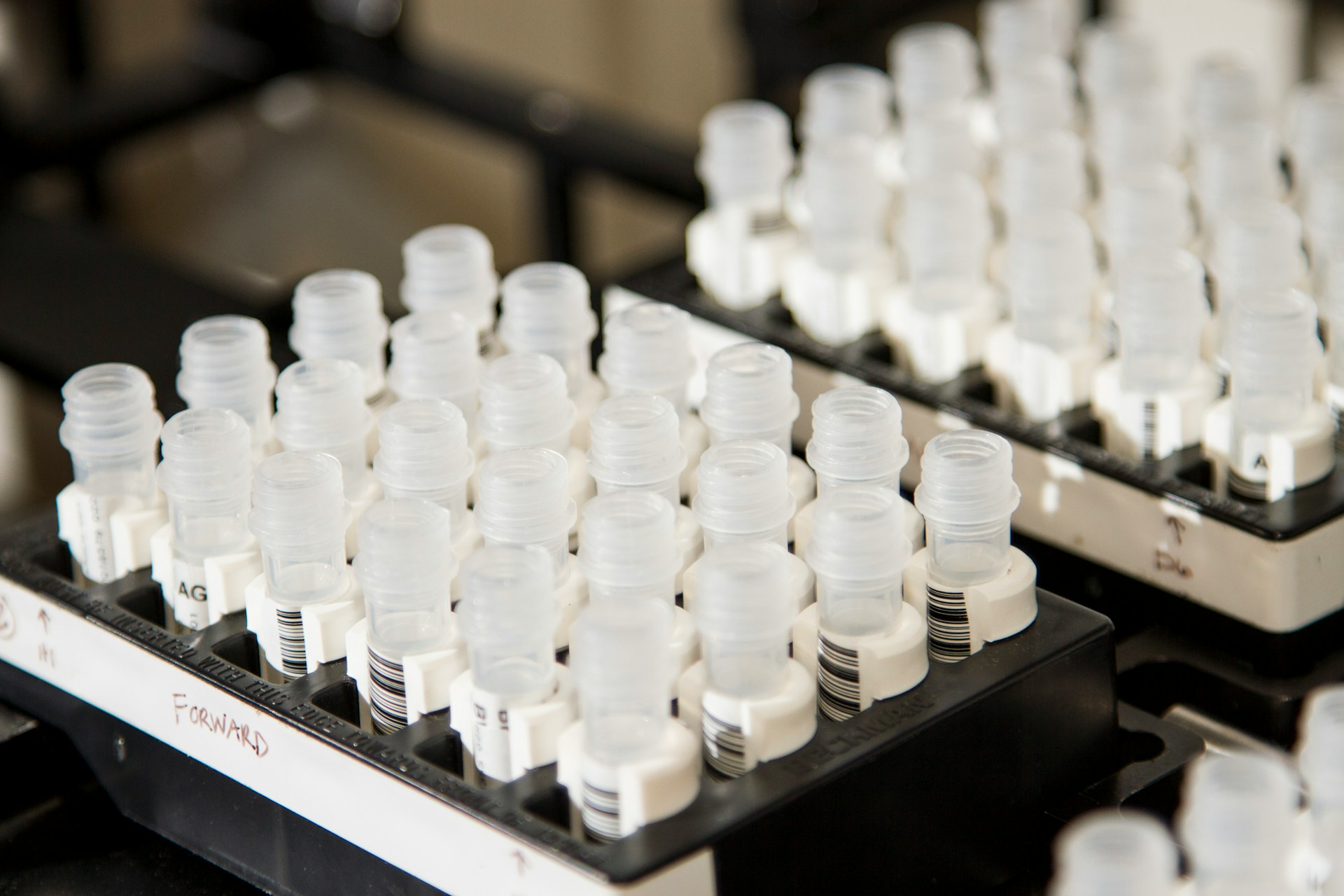INSIGHTS
The latest insights & news from Kinetica
The Proteomic Jobs Revolutionising the Healthcare Industry
14 Sept, 20237 minIn recent years, the proteomics industry has witnessed substantial growth due to the introdu...

In recent years, the proteomics industry has witnessed substantial growth due to the introduction of new technologies, increased insights into disease mechanisms, and the proliferating demand for personalised medicines. Proteomics is a revolutionary medicine technique, particularly in drug and biomarker discovery. As the need to increase the health population and drive innovation increases, the demand for proteomics jobs is considerable, and the job market is expanding rapidly.
In this guide, we will explore proteomics, its substantial effects on the healthcare industry, and the top, most in-demand proteomics jobs revolutionising the scientific and healthcare sectors.
Before we delve into the most essential proteomic jobs, let us answer the fundamental question of what is proteomics and how is it driving innovation within the healthcare industry?
What is Proteomics?
Proteomics is the extensive exploration of proteins, which are crucial components of living organisms, with diverse roles such as structural support, enzymatic functions, DNA synthesis, immune defence, and cell signalling. Proteomics delves into the assessment of protein function and structure to comprehend the nature of an organism.
Proteomics aims to unravel the intricacies of protein expression, production rates, modifications, subcellular movement, and interactions. The field has grown substantially, propelled by advanced technologies like mass spectrometry and microarray, facilitating large-scale experimental analysis of proteins and proteomes. This surge has sourced diverse applications in biomarker discovery and drug development.
As proteomics continues to drive innovation within the healthcare sector, the demand for proteomics jobs is continuously growing, as it is essential to implement new advancements in medicine techniques.
How is Proteomics Improving the Health Population?
Improvements in analytical technologies, such as protein microarrays and electrophoresis, have significantly enhanced proteomics, revolutionising protein analysis and identification methods. Remarkable breakthroughs have allowed researchers to gain deeper insights into the makeup of specific proteins and their interactions, leading to revolutionising discoveries, research, and a better understanding of biological activity.
The global proteomics market is expected to reach USD 65.91 billion in 2028 due to significant demand for personalised medicine through detecting diagnostic markers, high-funding research, and technological advancements.
Due to an ever-growing market the demand for innovative talent within the proteomic industry is substantial. As specialists in proteomics recruitment, we increasingly see global businesses seeking talent to fill roles within the intriguing sector of proteomics.
Next, we will delve into the crucial proteomic jobs that are driving innovation within the scientific and healthcare industries.
Business Development Manager
The role of a business development manager within an organisation that develops and manufactures proteomics products, is to promote the sale of their technology and advance a company's reputation within the market. The ability to engage with existing researchers and companies in both academia and industry environments is essential to promote proteomics technology.
A business development manager’s primary goal is identifying and pursuing new business opportunities by fostering customer relationships and contributing to marketing strategies and developments. Business developers must identify key customers, understand their requirements and aspirations, and advertise proteomic technology to propel sales.
To excel in this position, it is necessary to have a profound understanding of proteomics and its applications. Succeeding in this role can lead to senior management roles within an organisation, making it an excellent career path to follow.
Roles and Responsibilities
The roles and responsibilities of a Business Development Manager include:
- Identify and target potential customers within the field of academia and industry to promote your proteomics product portfolio.
- Provide technical presentations with the support of field application scientists to potential clients to demonstrate your technology.
- Stay educated on competitor products, trends, and technologies.
- Work collaboratively with sales colleagues, marketing specialists, field application scientists, and the wider organisation to optimise commercial success.
- Negotiate and close business deals.
- Monitor sales performance and highlight areas of improvement.
- Attend networking events to promote the company’s product portfolio.
- Develop and implement business strategies.
- Build and maintain solid relationships with clients, prospective customers and KOL’s.
Required Skills and Qualifications
A key requirement for a career as a business development manager in proteomics is a Bachelor's Degree or higher in a relevant scientific field, such as biology, microbiology or biochemistry. Most employers recruiting for management roles would also expect considerable commercial experience. A proven track record of positive performance in a business development role and an extensive network of relevant contacts is also essential.
Ideally, a candidate would have experience in business development within the proteomics field or another closely related industry. A successful candidate should also have a substantial proteomics market knowledge base, focusing on key competitors, new products, and customer satisfaction.
As well as these essential qualifications, a business development manager will need the following skills:
- Excellent communication and interpersonal skills with potential clients
- Strong work ethic
- Able to meet and exceed revenue targets
- Able to manage multiple tasks
- Negotiation and closing skills
- Ability to develop successful business plans
- Positive, enthusiastic mindset and the ability to work well within a team
Field Application Specialist
A Field Application Specialist is responsible for offering scientific and technical pre-sales support to the customer base. This position typically requires optimising and onboarding new proteomics technology, assisting customers in utilising proteomics products, and providing troubleshooting aid and training.
Field Application Specialists collaborate closely with researchers and the commercial team to grasp their specific needs, ensuring the effective utilisation of proteomic solutions. The demand for professionals in this role is global, making travel and relocation a career possibility. This opportunity is particularly exciting for individuals with a robust background in proteomics and a passion for supporting the application of cutting-edge sequencing technologies in research and industry.
Roles and Responsibilities
Typical responsibilities of a Field Application Specialist include:
- Provide expert guidance and customer support through implementing and utilising proteomic technologies.
- Produce product presentations, demonstrations, workshops, and training sessions to educate customers on the best proteomic practices.
- Cooperate with the sales team to navigate customer needs, deliver pre-sale support, and contribute to advancing customised solutions.
- Troubleshoot technical issues and provide quick, impactful solutions to optimise customer satisfaction.
- Stay educated on the latest innovations in proteomic technology and share knowledge with internal teams.
- Get customer feedback and use it to develop improvements.
- Represent the company and network events and tradeshows, engaging with the proteomic community.
Required Skills and Qualifications
During your job search, assessing whether you meet the required qualifications and skills is important. A qualified candidate is expected to have a bachelor's degree in a related scientific field, such as molecular biology or biochemistry, as it provides the fundamental proteomic knowledge needed to succeed in this position. According to a recent study, the most common degree for field applications specialists is a bachelor's degree, with 52% of field applications specialists obtaining it, demonstrating its importance.
A desirable field application specialist should also have a solid background in proteomics, spatial biology, or lab automation, where they can demonstrate implementations of proteomic technology. This background is vital when understanding the complexities of proteomics and the role requirements. Experience in a customer-facing role, such as technical support, is also desirable. However, it is not essential.
A Field Application Specialist must also demonstrate the following skills:
- Great communication and presentation skills and the ability to present complex proteomic concepts to various audiences
- Good problem-solving skills and the ability to troubleshoot technical issues
- Ability to build solid relationships with clients and stakeholders
- Ability to work well within a team
Proteomic Clinical Scientist
Proteomics scientists in the clinical sector are skilled professionals who employ proteomic methodologies in the medical domain, uncovering proteins associated with pathological processes and understanding how illnesses can impact protein expression. Their duties involve creating novel diagnostic and prognostic tests, pinpointing therapeutic targets, and ultimately facilitating the customisation of patient treatments.
Using advanced techniques like mass spectrometry and bioinformatics, they can identify, quantify, and characterise proteins, aiming to enhance diagnosis and prognosis while developing biomarkers for diagnostic and therapeutic purposes. Clinical proteomics jobs are dedicated to applying proteomic technology across all elements of clinical research and molecular medicine, specifically creating new biomarkers and applying them to clinical practice.
Roles and Responsibilities
Your responsibilities as a clinical proteomics scientist include:
- Designing and executing proteomic experiments
- Developing proteomic methodologies
- Data analysis and interpretation
- Staying educated on new technological trends and advancements
- Providing training on proteomic techniques and methodologies
- Maintaining high-resolution technologies
Required Skills and Qualifications
The required qualifications for a proteomic clinical scientist are an accumulation of educational background, previous experience, and specific skills. A bachelor's degree or higher in a science-related field, such as molecular biology or biochemistry, is essential, with experience working in academia or the industry.
If you have a bachelor's or master's degree in proteomics and have achieved at least a 2:1 grade, you are eligible to apply for the NHS Scientist Training Programme (STP) that provides the training to become a clinical scientist. This is a full-time, three-year work-based programme that also includes a Master's level academic study. If you do not have a degree in proteomics, a degree in a science-related field that consists of elements of proteomics, such as human biology, will also be accepted.
To become a proteomic clinical scientist, you will need these soft skills:
- Strong problem-solving abilities
- Strong communication and interpersonal skills
- Attention to detail
- Excellent time management and organisational skills
- Ability to multitask
- Positive, motivational mindset

Proteomic Research Scientist
Proteomics scientists in the research sector are the driving force behind innovative analytical technology in biopharmaceuticals. Research Scientists are responsible for designing and executing proteomic experiments, developing proteomic methods, and working on all areas of proteomics, such as interaction proteomics, targeted proteomics, and chemo proteomics.
It is essential for proteomic research scientists to attend conferences to remain knowledgeable on the recent advances in proteomics. Working collaboratively with other scientists to design experiments based on research breakthroughs is also essential for success within the role.
Roles and Responsibilities
Your responsibilities as a Proteomic Research Scientist would include:
- Plan and implement experiments
- Collect, analyse, and report data
- Meet project milestones in a timely manner
- Collaborate with multiple teams within the organisation
- Execute duties for laboratory instrument maintenance
- Staying educated and researching new proteomic advances and trends
- Attend network events and scientific conferences
Required Skills and Qualifications
A key requirement for a career as a Proteomic research Scientist is essential to have a bachelor's or master's degree in a life science-related field, such as biology, biochemistry, or genetics, that has a focus on proteomics.
It is typically a requirement to have a minimum of 1-year experience in a research lab setting, with a primary focus on proteomics. It is also important to have knowledge of software and databases such as Mascot and Uniprot and experience in sample preparation techniques such as protein isolation and quantification.
It is critical to deeply understand protein structure and function and have experience in protein analysis, such as bioinformatics.
On top of these essential qualifications and experience, you will also need to demonstrate the following skills:
- Excellent communication and interpersonal skills
- Ability to work under tight deadlines
- Excellent organisational skills
- Attention to detail
- Expertise in proteomics techniques and technologies
- Planning and problem-solving skills
- Analytical skills
Final Thoughts on Key Proteomics Jobs
The proteomics industry stands at the forefront of healthcare innovation, with its profound impact on drug discovery, biomarker identification, and personalised medicine. As the demand for proteomic technologies continues to surge, the need for skilled professionals in key proteomics jobs becomes increasingly critical. The top proteomics jobs discussed in this guide represent the crucial roles that make valuable contributions to the healthcare and scientific sectors.
The demand for skilled professionals with the right qualifications and expertise is evident as the proteomics industry continues to evolve. The diverse skill sets required for these roles, ranging from technical proficiency to strong interpersonal and communication skills, highlight the dynamic nature of proteomics careers. Contributing to groundbreaking discoveries and advancements in healthcare makes these proteomics jobs challenging and immensely rewarding.
To discover how to create a stand-out CV in Genomics and Proteomics jobs, take a look at our insightful guide - Expert CV Advice for Genomics and Proteomics.
Experts in Connecting Talent to Proteomics Jobs
Our mission is to provide expert proteomics recruitment solutions to candidates seeking a career within the industry. We connect top-tier talent in proteomics to organisations, driving innovation within the proteomic field.
Whether you are a candidate seeking the most suitable proteomics jobs or a business looking for exceptional talent, contact our team today to get the support you need.



